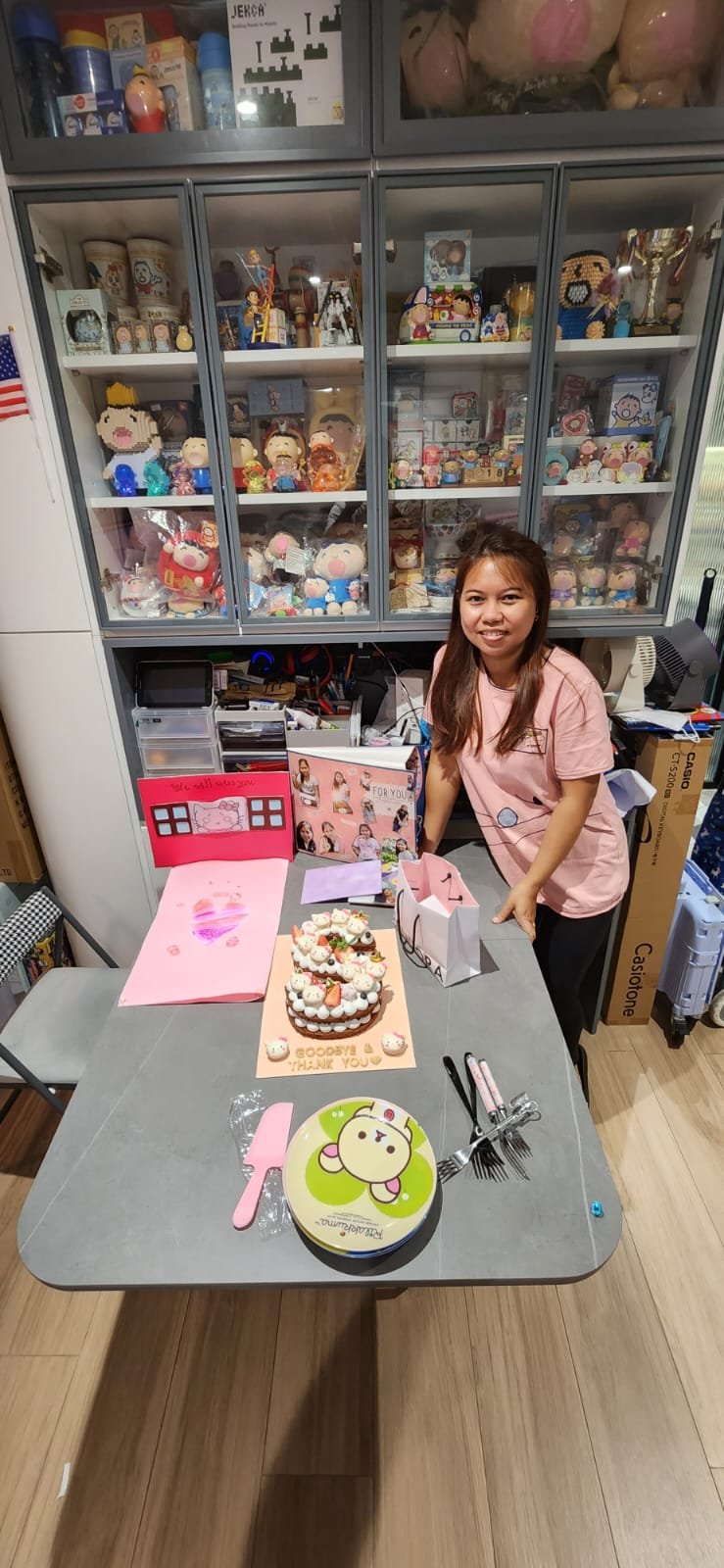Prepare Your Helper for a Smooth & Auspicious Chinese New Year! 🧧
Chinese New Year is fast approaching, and we know this means a busy time for your household! To ensure a smooth and joyous celebration for everyone, we've put together some helpful tips to prepare your domestic helper for the festivities, while avoiding any cultural faux pas:
Explain the Significance: Share the meaning behind CNY traditions like lion dances, red envelopes, and family reunions. This helps your helper understand the cultural context and appreciate the importance of their role during this period.
Food Preparation: Discuss your CNY menu in advance. Filipino cuisine differs greatly from Chinese, so providing clear instructions and recipes for traditional dishes is essential. Consider a trial run beforehand to ensure everyone is comfortable with the preparations.
Guest Etiquette: Inform your helper about expected guest etiquette, such as greeting guests with "Kung Hei Fat Choi," offering tea and snacks, and assisting with serving. Explain any specific seating arrangements or cultural sensitivities related to serving elders.
Gift Giving: Explain the tradition of "lai see" and clarify who should receive red envelopes. Advise your helper on appropriate attire for visiting relatives or attending New Year gatherings.
Time Off and Expectations: Communicate clearly about your helper's schedule during the holidays, including any expected days off or adjusted working hours. Openly discuss any additional duties, like childcare or assisting with guests, and ensure fair compensation for extra work.
New Year's in the Philippines
Fireworks in Culion, Philippines
New Year's Day, or Araw ng Bagong Taon, is super important to Filipinos. Their New Year traditions and cultural practices reflect their hopes for prosperity and good fortune in the coming year. (Sound familiar?) The celebration is deeply rooted in a blend of local customs and influences from Spanish and Chinese cultures.
New Year's Day is not just a holiday; it symbolizes a fresh start and renewal. Filipinos engage in various traditions to welcome the new year with optimism:
Media Noche: At midnight Filipino families gather together to share a lavish feast that includes traditional dishes such as lechon (roast pig) and pancit (noodles), which symbolize abundance, prosperity and good health for the year ahead.
Fireworks and Noise: The night leading into New Year's Day is characterized by loud celebrations, including fireworks and firecrackers. The noise is believed to scare away evil spirits, ensuring smooth sailing for the year ahead.
Unique Traditions:
Filipinos have some unique traditions associated with the New Year celebrations, including:
Wearing Polka Dots: Many Filipinos wear clothing with polka dots, as round shapes are thought to attract wealth and good fortune.
Jumping at Midnight: Children are encouraged to jump high as the clock strikes twelve. This is believed to help them grow taller in the coming year.
Twelve Round Fruits: Families often prepare twelve round fruits, one for each month of the year, as a symbol of prosperity. These fruits are displayed prominently on the dining table during Media Noche.
Open Doors and Windows: To welcome good fortune, many Filipinos open their doors and windows at midnight, allowing blessings to enter their homes. To be honest, doors and windows are open most of the time anyway because it's just really HOT there.
Community and Family: New Year's Day serves as an occasion for family reunions and community gatherings. Filipinos neighborhoods or barangays plan events and celebrations on the local level. Everyone in the community participates and they are joyous and fun occasions that bring together people of all ages, faiths, and cultures. These community celebrations foster a sense of unity among Filipinos. They may not have a lot of material goods, but they have each other.
Angry!
I updated the bio of an arrow lady today who is finishing a contract soon. I asked her why she's not renewing with her employer And she said "My madam is always angry". If you are often or always angry you will not be able to keep a helper for more than one contract. If you are an employer why not save yourself a lot of money and enjoy a happier family by discovering and dealing with the root causes of your anger? HINT: It's not your helper.
The brains of pregnant women undergo major rewiring
Couples having their first child prefer helpers who are mothers themselves. I often say that is because there "mommy antenna" is now up and they are sensitive to issues with babies. A new study now documents the real changes that happens to a woman's brain during pregnancy. Read about it here If you are pregnant and feel that your brain is changing, you’re not crazy, your brain is undergoing a major transformation.
How to talk to your helper
What are the best ways to talk to your helper?
Talk to your helper regularly.
Set a weekly time to talk to your helper. Take 10 - 30 minutes max once a week to sit down together and talk. When your helper first arrives at your house, tell her that you will have a weekly chat to go over the past and upcoming week. Make it a priority and don’t go overtime. Possible times might be Saturday morning before the day gets busy or Saturday evening after the kids are in bed. Sit down together at the table and have a good chat.
Ask her for feedback
“How are you feeling about your current tasks and responsibilities?”
“What challenges are you facing, and how can I help?”
“Do you have any feedback for me regarding our household dynamics?”
“Is there anything you feel is hindering your performance or job satisfaction?”
Go over your top concerns
Share with her your top 1-2 concerns: areas where you really need her to do well. Let her know what “doing well” would look like from your point of view, e.g. “I need the kids to be fed, bathed and ready for bed by 8 p.m.”.
If you find yourself giving negative feedback, be sure you, at minimum, express confidence in her: “I know this is a big adjustment, but I know you will be able to cope up to our Hong Kong way of doing things. Just keep on getting better and better.”
Go over the schedule for the coming week
Remind your helper of important events in your family, such as tutorial classes, after school activities, etc.
Benefits
By taking just a few minutes every week to communicate with your helper you will:
Build a stronger relationship of trust with her
Help her grow in her confidence and ability
Gather important feedback that will help you lead your family
Cause your helper to feel like she is an important part of your family
Keep your helper for more than one contract. Filipinos value a good relationship with their bosses more than money. If you establish healthy communication with her she will be loyal to you.
I hope you found this helpful. If so, please talk to us! Leave a comment.
When your helper borrows money
At least once or twice a month a customer will call me to ask me for advice on how to handle a helper who has borrowed money. Many employers warn their helpers about borrowing and even tell them that borrowing money is grounds for dismissal, but helpers still borrow money. Why? What is happening? What can you do about it?
Why do helpers borrow money?
Helpers borrow money for many reasons, but the most common ones are:
to buy a house:
to pay critical medical bills for a loved one: Healthcare in the Philippines is not free, and unless you pay first, hospitals will often refuse treatment. If the helper’s choice is between obeying her employer re borrowing OR saving the life of a loved one - well, you know what they will choose.
to pay tuition for their children’s education
to start up a business or invest in a business they already have
to meet critical bill deadlines. Sometimes they have bills due on the 1st of the month, but their employer doesn’t pay them until the 3rd. If they are late paying - they incur fees and interest charges. Most of the time when this happens they will ask their employer for an advance on their salary.
What is happening?
Helper’s basic salary is only $4870 per month. Almost all of this goes for their family’s basic needs: utilities, food, school uniforms & supplies, rent or house payment. They do not have any extra in case of emergencies. AND emergencies always happen. It’s called LIFE. Storms destroy crops, parents become ill, appliances break, etc. When that happens they don’t have any way to take care of those emergencies except to borrow money. In addition they have never learned about money or how to manage it. They lack basic financial education.
What can you do about it?
Threatening to fire helpers IF they borrow money does NOT work. If the need is great enough they will borrow, even if they have promised to “never borrow money”. Threats will only insure that they do not talk to you about their financial problems. If you’d prefer to never hear about their financial woes, threatening to fire them if they borrow - will guarantee that you won’t hear about it UNTIL they miss a payment. What options are there?
Talk to them about their goals. If they don’t mind sharing, ask them what their financial goals are. Why are they here working in HK and not with their families in the Philippines.
Share with them your concerns about borrowing and explain to them what happens in HK when someone misses a payment.
Help them to open a bank account and/or Alipay account. Depositing salary directly into a bank account helps them to save, because they can take out some of the salary to send home, and also watch the remaining money grow slowly month by month. You could even create an incentive like “for every $500 you deposit in this account, I will add 10%, $50, up to a max of $XXX/month.”
Send them to attend financial training. Pay for the training and together discuss what they learned.
Enrich is a HK organization dedicated to helping migrant workers increase their financial IQ. They offer frequent workshops for helpers. Send your helper to a workshop as part of her employment package.
If you have found other ideas that work well for you, please leave a comment. Let us know what you think, agree or disagree, we’d love to hear from you.
Is “job hopping” really a thing?
There has been a lot of press lately about the problem of helpers job hopping. Is this something you should be worried about? The answer is “Yes, and No”. Let me explain. Job hopping was a thing during the pandemic, because the Immigration Department allowed helpers who were terminated to stay in Hong Kong while applying for a visa to work for a new employer. There was a severe shortage of domestic helpers because flights were often suspended due to travel bans, quarantines made hiring from abroad expensive and the process was unreliable due to the pandemic. To alleviate the shortage Immigration allowed helpers to change employers without having to return to the Philippines. That was then, this is now. Now helpers who want to change employers must wait in the Philippines while Immigration decides on their visa. That is not the biggest problem they face. The biggest reason that helpers won’t change employers is because “few people want to hire someone who breaks their contract”. We all think “I’m not a perfect employer. If she quits on them, she may also quit on me.” Hiring a helper is expensive so I’m going to spend that money on someone who has not broken a contract.”
“I’m not a perfect employer. If she quits on them, she may also quit on me.”
Hiring a helper is expensive so I’m going to spend that money on someone who has not broken a contract.”
Job hopping is not a real problem that you should worry about. But QUITTING IS STILL A BIG PROBLEM. Filipino domestic workers will resign if they find their work situation intolerable, but they won’t change employers; instead they will leave the job market altogether and stay in the Philippines. When a helper leaves your employ they end up going back to the Philippines. Domestic helpers are not leaving their employers for “greener pastures”. They are leaving because they find the working conditions intolerable. Changing the laws to make it more difficult for a helper to quit won’t solve the problem. What is needed is education for both employees and employers, so that Filipinos know what to expect when they come to work in HK, AND so that employers know how to effectively manage Filipino workers.
When helpers ask us for help, we teach them coping skills because we want them to finish their contract. That is what is best for them and best for our customers. Arrow’s Overseas Standard Package includes an evening orientation for employers on how to manage a worker from the Philippines. What are the main issues that they need to cope with (as reported by the helpers):
long work hours (anything more than 12 hours a day is too long)
not enough food or frequent interruptions to their meal time
nagging or overly critical supervisor, and micro-managing
asking them to work on their day off
When these issues pile up too high, the helper resigns. We try to convince them to stay because we know they need the money, but they never do. They are not hopping to another job, they are escaping a work environment that they can’t handle.
If you don’t want your helper to hop back to the Philippines, what should you do?:
Don’t overwork them. If they work late, give them time off during the afternoon to rest and contact their family
Ask them about their meals, make sure they are getting enough food that they like
Don’t interrupt their meal time
Respect their day off. Don’t ask them to work on their day. If they do some chores, thank them for doing so.
Be civil with them. When they make mistakes point them out calmly and keep your correction short and to the point. Don’t lecture.
Job hopping among domestic workers is IMHO a “fake” issue in Hong Kong. The real issue is Employee Retention. By doing our best to make our workplace a pleasant place to work, we can reduce the risk of our domestic helpers resigning and returning to the Philippines.
What do you think? Leave a comment.
Allan @ Arrow
3 things HK employers wish their helpers knew about HK people
My last blog post was about “what Filipino workers wish their employers knew about Filipinos. It’s time to balance the books. This post is about 3 things HK people wish Filipinos knew about us.
HK people value our privacy and personal space.
Domestic workers live with their employers and naturally they hear and see a lot. They hear our fights, see our messes, clean up after us when we’re sick. HK employers expect helpers to respect their personal space and privacy. Helpers should never gossip about their employers, but should be zealous to protect the family’s good name. Workers should not invite guests over to the employer's home without permission. They should also respect their employer’s personal space and belongings. This includes never using their employer’s address to obtain a loan, not entering their rooms when they are there without knocking first, and not “exploring” their personal things. Homes in HK are small compared to many other places, so respecting the space, property, and privacy of others is essential for maintaining a harmonious relationship. On the other hand, the employer should follow the same rules and respect the personal space and privacy of the helper.
2. HK people value Punctuality and Reliability:
Punctuality and reliability are essential qualities that Hong Kong employers expect from their Filipino domestic workers. If you are not a few minutes early, you are already LATE. Employers expect their workers to arrive on time and complete their tasks on schedule. Workers should be reliable and dependable, ensuring that they complete their tasks without constant supervision. And from the worker’s POV, it’s hard to complete work on schedule if your employer is constantly interrupting you and calling you away to do other tasks. Keeping interruptions to a minimum helps workers keep to the schedule.
Employers understand that delays can happen, but workers should communicate promptly if there are any delays or issues. Employers value workers who are responsible and accountable for their work.
3. Hong Kong people want their Filipino workers to know that we have high expectations and when our workers don’t meet our expectations we sometimes get frustrated and angry. When that happens, please know that it does NOT mean we don’t like or appreciate you and your hard work.
Hong Kong is a stressful place to live and work. At one time it was considered the most stressful city in the world. Our education system and culture puts a lot of pressure on HK people to perform well. We, in turn, expect our workers to excel and perform well. Pressure is one of the tools schools and companies use to get high performance from people. It works for us, but we forget that it probably won’t work on Filipinos because you didn’t grow up with it. Please know that we are learning too, and we believe you can perform at a high level. If we put on too much pressure, please remember we want you to succeed; we do NOT want you to quit; we value your contribution to our family.
At Arrow we want our customers to find and keep good helpers. We want our applicants to find and keep a good job. When we make an effort to understand one another’s culture and ways we are increasing the chances that we can stay together for many years to come. Feel free to leave a comment.
3 things Filipinos wish their employers knew about Filipinos
Before getting into this post I want to say “I would love to do a post entitled “3 things employers wish their Filipino workers understood about Hong Kong people”. If you have some ideas - please leave a comment.
Filipino people wish their HK employers knew how much they value:
Respect:
Traditional greeting to an elder in the Philippines
Filipino culture is a respectful culture. “Sir”, “Ma’am”, “Po” are words they use in everyday language to address people in the Philippines. They have ritual greetings for the elderly and have a strong desire to honor people. They also expect to be treated with respect, kindness and consideration. Filipinos are shocked and sometimes traumatized when HK people yell at them, scold them, and get angry. They expect to make mistake and they are open to correction, but anger makes them feel like they are under attack.
Work-Life Balance:
Some Hong Kong people live to work. Filipinos definitely “work to live”. They have goals and things they want to accomplish, but they also want to have a life. Filipino workers appreciate employers who recognize the importance of family and personal time. Providing flexible working arrangements and respecting their time off will help you retain your worker for many years.
Fairness
Filipino believe that life and people should be fair. I think they take this idea too far, e.g., if I help someone out with a money gift (before you ask, “No la!” ) they think I should be willing and able to do it for everyone. “Sorry, life doesn’t work that way”. Helpers, like the rest of us, want to be treated fairly and equitably. They expect to be paid a fair wage for their work, be paid on time, receive their full day off, and to be given the same opportunities and benefits as their colleagues. On their day off they share with others about how their work life is going, and they compare YOU with the employers of their friends. “Wah, you’re so lucky! Your employer is so kind. My employer … “ They want to be able to boast that they have the best employer.
If you treat your helper with respect and fairness and are careful to give her time for work-life balance - then you will be the employer that causes other helpers to exclaim “Wah - you’re boss is so good!”
Help! I'm drowning in Hong Kong!
I'm currently in the Philippines and have recently gone scuba diving! My dive master teaches me that life under water is very different from life on land, and makes sure I will survive my plunge into the ocean depths (well not so deep). I have to learn to breathe, maintain neutral buoyancy, not go too deep, clear my mask, etc. It's a different world down there, and I need to make some major adjustments to enjoy it.
For Filipinos, working in HK is a bit like scuba diving. She is choosing to live and work in the ocean of Hong Kong culture. Things may seem similar to the Philippines, but they are, in fact, very different. She is taking a deep dive in a strange ocean.
She needs a new set of skills if she is going to survive.
SHE NEEDS YOUR HELP!
As an employer of a Filipino cross cultural worker, you are her Dive Master. You need to teach her how to survive and thrive in the strange new environment of your family and culture. If you don't make an effort to help her adjust you may find yourself looking for a new helper every 3 months. That is both expensive and very inconvenient. What can you do?
Send her to our New Arrival Classes
Arrow gives the helpers basic training before they come to HK. We also have follow up classes for helpers after they arrive. If her day off is Saturday or Sunday, tell her to attend the New Arrival Class called Tagumpay.
Attend our Employer Orientation Evening Seminar
Arrow has an evening seminar (included in the Standard Overseas Hire Package) designed to help you help your worker adjust successfully to life and work in Hong Kong. Your role in your worker's adjustment and long term success is crucial.
Here is what some recent attendees have said about our Employer Orientation Seminar.
If you want to sign up for our Employer Orientation Seminar, message Kathy Lam.
How to prevent helper BURNOUT
When is it TOO LATE?
By the time a helper says "I'm giving my 30 days notice" - it's already too late. In our 15+ years of experience we know she will not change her mind, and our customers will have to start the process of finding and hiring a new helper AGAIN! At Arrow our goal is to help customers FIND AND KEEP A GOOD HELPER. There are 3 reasons helpers resign early:
Lack of rest
Too little encouragement and too much criticism (coming soon)
Recently I was in the Philippines where I have a small house that was under renovation. The workers showed up promptly at 8 a.m. in the morning and finished promptly at 5 p.m. at night. At around 10 a.m. they stopped for a 15-20 minute coffee break, at noon they took a 1 hour lunch break and in the afternoon around 3:30 p.m. they stopped for more coffee and a snack. This was their routine. Their boss was expected to provide the coffee and snacks. Workers in the Philippines generally have set working hours with lunch and coffee breaks.
In Hong Kong, domestic workers are sometimes expected to work from 7 a.m. to 10 p.m. with no set lunch break, no coffee breaks, AND some employers expect them to do a lot of chores before and after they go for their day off OR ask them to exchange their days off for money. Helpers say "Yes Ma'am, it's OK" because they don't know how to say "No" to the boss and then after 3-4 months they then tell their boss that they are having a "family problem" and need to resign. The real reason is that they are burned out, but they will never tell this to the employer. The helper now has no job, and the employer needs to pay another agency fee and wait for a replacement to arrive. It's a total lose - lose situation. Because the employer doesn't know the real reason, the cycle continues...
WHAT CAN YOU DO TO MAKE SURE YOUR HELPER DOESN'T BURN OUT?
Give your helper a full day off EVERY week.
Helpers willingly accept a reasonable curfew (8 or 9 p.m. on their day off) and they anticipate completing a few simple chores before heading out and after returning at night. They do not expect to prepare breakfast for the family and clean the kitchen before leaving OR do the laundry, and so on. They put in great effort for 6 days. They DESERVE a day off, away from you and your family. Avoid messaging them on their day off unless it is truly urgent.
Ensure that your helper has adequate breaks during work hours.
Your helper requires time to unwind, check their phone messages, indulge in a mindless Facebook video, or talk to their children, etc. They should be able to do this during their lunch or coffee breaks. Try to respect their personal time during these moments. NOTE: Most children in the Philippines are asleep by 8 p.m. so if you tell your helper she cannot use her phone to contact her family until after the work day is finished, she won't be able to check on her kids. How long would you stay at a job where the employer didn't allow you to contact your family?Establish a reasonable workday.
Household chores seem to be never-ending and monotonous. However, it's important to remember that some tasks can be postponed until the following day. If your family's schedule tends to stretch late into the evening, compensate your helper by providing them with longer breaks during the daytime. This will allow them to unwind, catch up with their loved ones, indulge in a refreshing shower, and get the rest they need. It's widely known that most adults require a minimum of 7 hours of sleep every night. Therefore, it's crucial to avoid imposing a workday longer than 12-14 hours, as it can ultimately lead to burnout.
We hope you and your helper will have a long and fruitful working relationship. Making sure she gets enough rest will help you along that road.
In my next email, I'll talk about how Filipinos react to feedback from employers.
If you have a co-worker, friend or family member looking for a helper please send them to Arrow and to mention your name for 5% off the normal fee. Thanks!
Using food to build a good relationship with your helper
When you travel overseas, what do you eat?
Whatever the local people eat
A mix of local and your favorite cuisine
Only food from your home area
Before starting Arrow I worked for a religious organization. While working there I went with HK people on a short term mission trip to India. After we settled into our accommodation I was surprised when some members of our team opened their suitcases. Instead of clothing, the suitcases were full of Doll Noodles, Cup of Noodles and other assorted HK instant meals. We were in another culture to learn and serve, but my teammates were afraid of the spicy local food, so, to be safe, they brought their own food.
When I first moved to Hong Kong in 1988 there was one day when I had to have American food. I found a restaurant called the American Restaurant and went there for a pancake breakfast. To my great disappointment they did not taste anything like American pancakes! I was so glad when McDonald's finally came to HK and I could get a good hamburger or pancake meal! Now when I need a good hamburger I can go to Shake Shack!
When we travel from home for only a few weeks - we all long for the comfort of food from home. We take food with us, and search for restaurants with a touch of home cooking. We sometimes can't go for even 2 weeks without eating food from home. Imagine what it must be like for a Filipino worker to go 2 years without eating food from home??? At best, they only get food from home, once a week on their day off.
One of the biggest issues Filipino workers have with life in HK is the food. They often complain about NOT receiving enough food and being given leftovers to eat. Being a good employer involves making sure your helper has a happy tummy. The good news is: IT'S NOT DIFFICULT!
typical Filipino breakfast
SUGGESTED MENU:
Breakfast: All the rice she can eat, 2 eggs with some onion and a few veggies and some meat.
Lunch: Noodles with an egg or some meat & veggies
Dinner: Whatever she is cooking for the family.
Coffee break: coffee & a pastry or bread
Keeping a good Filipino helper begins with making sure their stomach is happy. Food, rest and encouragement are their 3 big needs. I'll talk about the latter 2 in another email. Bon Appetit!
How Old Is Your Anger?
“‘Young’ anger is frustration that has recently emerged. You feel it. You can access it. You haven’t suppressed it. You can deal with it. ‘Old’ anger is anger that has been simmering underground and often out of awareness for a very long time, leading to feelings like bitterness, resentment, and even disengagement. “
Dr. Jim Jackson, licensed psychologist, author, Director of Behavioral Health at Vanderbilt Medical Center
I recently read an article with this quote. I never thought about the age of emotions. Young emotions are easier to deal with because they haven’t hardened. Old emotions are like a soup or stew that has been allowed to cook too long and is impossible to clean from the pot. The age of our emotions matters. Old emotions may point to past traumas, and if we treat them with curiosity, we can learn from them.
What does any of this have to do with managing a helper? Filipinos struggle with the emotion of fear. Displays of anger tend to make them either freeze or run away. HK people often struggle with the emotion of anger. When anger meets fear, fear runs away like a deer fleeing a lion. If you want to keep a helper for the long term, then it pays to learn how to manage your anger. People with anger issues do not keep helpers, and hiring a new helper every few months is an expense most of us can’t afford. AND, if we can figure out the source of our old anger, and deal with it, we’ll be happier.
I think the idea of young or old anger is helpful. If my anger is old, then it is probably NOT about my helper or the crazy thing she just did. It’s probably about some hurt from my past, and if I can recognize what it is then I can deal with it. If my anger is young, then I can take a deep breath, use a time out, and decide how to address the issue in a way that won’t scare my helper into resigning.
How old is your anger? Leave a comment.
How to keep the Hungry Ghosts away
One of my customers reminded me that the Hungry Ghost Festival is coming soon. The month-long festival starts Aug 16, 2023 and ends mid September. The Hungry Ghost Festival holds great significance in numerous Asian cultures, so it is important to understand and respect local cultural guidelines. First, it is customary to make offerings of food, candles, and incense as a means to pacify the spirits of the deceased. This act is believed to bring forth blessings and good fortune
There are also some definite DON’Ts. The following article from timeout.com lists 8 definite things to avoid doing during the Hungry Ghost Festival. Is shaving your legs ok or not? Click the link below to find out.
Hiring Indonesian Helpers Just Got a LOT MORE Expensive
Who should pay the agency fee? The Indonesian government says that the HK employer must bear the cost.
The Indonesian government has recently made a significant decision regarding the hiring of helpers from Indonesia by HK employers. In the past, the burden of hiring costs was primarily placed on the helpers themselves, artificially keeping the cost lower for HK people. Before arriving in Hong Kong, Indonesian helpers typically undergo training for 3-6 months, learning skills such as Cantonese, cleaning, and cooking to be able to perform their work satisfactorily. However, the helpers do not have the financial means to pay for this training. As a result, upon arrival, they are often taken to a loan company by their agents to borrow money. This borrowed amount is then divided, with some paying for the training school while the remaining portion might end up in the pockets of the Hong Kong agency, which also collects fees from the employers.
The Indonesian government has now decided that HK employers must take up the responsibility of funding their workers' training. Consequently, the cost of hiring an Indonesian helper will now amount to approximately $20,000. While the cost has always been this high, it is now solely the employers' responsibility, rather than being shouldered by the helpers.
This move aligns with the zero placement fee policy implemented by the Philippines years ago. Although the fee increase initially surprised customers, it has ultimately proven beneficial for the industry. Helpers arrive and begin their jobs without debt, allowing their families to immediately benefit from their salaries. This factor makes them less likely to resign and enables them to manage any emergencies in the Philippines with greater ease, thanks to the financial cushion. Arrow Employment Services welcomes the overdue decision made by the Indonesian government. When workers are not burdened with excessive debt, they are better able to provide their services, as they are less likely to become discouraged and quit prematurely. Furthermore, they are less likely to return home early due to problems in their home country. Ultimately, workers who are happier and unencumbered by heavy debt are more likely to stay with their employers for the long term.
Your helper might be thinking about resigning
Your helper may be thinking about resigning. If your helper has been here 1-6 months she may be getting fed up with our HK culture, the long work hours, demanding and critical supervision, and the lack of good food, rest and encouragement. To make things worse, some employers don't let their employees enjoy their weekly day off, and these employers are "high risk" for losing their employees.
Why you may not be fully aware
Filipinos think differently about work than HK people. In Hong Kong, as long as our bosses pay us on time, we consider it an acceptable job. If we are not satisfied, we will continue working while searching for better opportunities before giving notice.
Filipinos expect to find happiness in their work.
AND if they are unhappy they won't tell you!!!
When you ask them
"Is the food enough? they respond with "yes Ma'am". When asked
"How are you feeling?" they say "Fine".
"Are you ok to clean my mother's house for some extra $$?" "OK"
"Can you work on your day off and I'll pay you extra?" (a very BAD IDEA) they will agree.
They answer this way because they perceive the boss/employee relationship as imbalanced, with you holding all the power. They may not feel safe expressing their discontent or sharing if they are overworked or not receiving enough food. Instead, they endure the bitterness for 2-3 months before ultimately deciding to resign.
Once a helper expresses the idea of resigning, they rarely change their mind. I have attempted to persuade Filipinos not to resign, but once they mention it, they always maintain their stance, stating, "I am no longer happy working for them. I have made up my mind."
"I am no longer happy working for them.
I have made up my mind."
What to do?
As an employer, what can you do to retain your helper and avoid spending additional time and money to hire a replacement? Understand why they are quitting. When an overseas worker decides to resign it is because the combination of push and pull factors are too high. Pull factors are things that might pull her home (e.g., homesickness, culture Shock, etc. ) and Push factors are things employers do to push helpers out the door. (e.g. not enough good food, rest, etc.). Here are some common push/ pull factors:
Focus on What You Have Control Over
Minimize the Push Factors
You control the push factors! You can make sure your helper has enough fresh food (especially rice). You control when her work day finishes, so you can give her enough time to shower, relax, to chat with her loved ones, and to get at least 7 hours of sleep. If she is working more than 14 hours a day, that is excessive. You control your temper. Angry bosses frighten Filipino workers, and frightened workers QUIT. Her performance is NOT the cause of your anger. Many HK employers face the same type of job behavior without losing their tempers. If you are angry all the time, YOU WILL NOT KEEP A FILIPINO HELPER.
Indirectly reduce the Pull Factors
You can't directly control the Pull Factors such as homesickness, loneliness, etc. BUT you can INDIRECTLY influence them. Give your helper enough time to stay in touch with her family and children. Give her a full day off (don't cheat by asking her to do chores on her day off). During the day off she is able to talk Filipino, eat Filipino, BE FILIPINO, send money to her family, laugh and build friendships with other OFWs. Arrow has New Arrival groups on Saturday and Sunday for helpers. At these groups they learn how to cope with homesickness, culture shock, stress of life in HK, etc. If she doesn't have a full day off she may not attend our groups. Too many employers are PUSHING their helpers toward resigning and they are ALSO influencing the STRENGTH of the Pull Factors by putting restrictions on their helper's day off.
Find and Keep a Good Helper
Our goal is to help HK families Find and Keep a Good Helper. Our goal for Filipinos is to help them Find and Keep a Good Job. It is our hope that our customers will cooperate with us to achieve these goals. You don't want to pay $15,000 every 6 months to hire a new helper, and we don't want that for you. As part of our Standard Overseas Package we include an evening New Employer Orientation taught in Cantonese. If you are hiring your first helper or have trouble keeping a helper, please attend NEO. You can What'sapp Kathy Lam the facilitator directly at +852 9603 5956 to sign up for the next NEO.
We hope your helper will work with you and your family for many years!
Allan @ Arrow
Celebrating 8 years of Service



An Arrow family sent me these pictures from their celebration of 8 years with their helper. She is heading back to the Philippines and her replacement has already arrived. The family celebrated her service with a big send off, and gave us permission to share these photos with you. Our goal remains to “help you find and KEEP a good helper”.
Looking for a helper? Start with a job description
Looking for a helper? Start with a job description
Hiring a domestic worker is a BIG decision for any family. Before you begin interviewing applicants, please consider FIRST writing a basic job description. A clear and concise job description will help both you and the applicant to evaluate IF you are a good fit for each other. The job description can also be used as a guideline for regular, scheduled times of evaluation, during which you can review the job description and discuss the worker's performance in key areas.
Ingredients of a good job description
A job description should include a job summary, duties and responsibilities, qualifications, and parenting style (if you have kids) . It should provide an overview of the position, including the normal work hours, day off, and a description of the accommodation you are providing the worker. The duties and responsibilities should outline the tasks that the worker will be responsible for, such as marketing, preparing meals, cleaning, laundry, and caring for children. The qualifications should include the necessary skills, education, and experience required for the job. Most domestic workers are NOT university graduates, so be realistic in this regard. Good communication skills in spoken and written English are usually more important than the level of education. The parenting style should describe the family's values and expectations for discipline, education, and other child-rearing practices.When writing a job description, it is essential to be specific, detailed, and concise. A one to two page job description will be more useful than a 10 page one. The job description should not include any language that could be interpreted as discriminatory based on race, gender, age, religion or any other protected characteristic.
Revise the job description as needed
There is a well known saying "no plan of war survives the first battle". The same will probably be true of your job description. After your helper starts to work, you will need to adjust it to fit the reality of the job and her specific needs, abilities, and personality. A job description is not the 10 commandments. Expect that you will need to revise it.
Sample Job Description
We are a family of 3: my husband and I both work and we have a 3 y.o. son who goes to kindergarten. We are looking for someone who will take good care of our son, do the household chores, marketing and cooking. The ideal applicant would be someone who is between the ages of 35-41, has children of her own, and has worked abroad before.
Both my husband and I work long hours, so our helper also needs to be prepared to work long hours. Your day will start before 7 a.m. and will normally finish after dinner around 9:30 p.m. In the morning you will normally prepare breakfast for our son and get him off to kindergarten. Sir and I don't eat breakfast at home. After our son goes to school you will need to do the marketing for the evening meal. I will give you a menu to follow. I hope you will learn quickly to cook Chinese food well. A detailed schedule will be provided in the future. The work week will be from Monday through Saturday with Sundays off. We will usually provide you a break in the afternoon where you can contact your family and have a brief time of rest.
Our home is small, 600 s.f. with only 2 bedrooms, so our helper will need to share a room with our son.
Our top priority is our child. We are hands-on parents and most of the time will try to put our child to bed ourselves. We do not spank or shout at our child, and will not tolerate a helper who does so. The safety of our son is paramount so keeping him safe both inside and outside of the house is your top priority. We expect and hope you will develop a loving relationship with him.
Good communication is important to us, so if there are any problems with our son or our home, we expect you to contact us immediately so we can advise you on what to do. We can't promise that we will never become emotional, but we will do our best to communicate in a respectful way. We also expect you to maintain respect and honesty in all communications. We need to know what is happening so that we can give you good instructions when there is a problem or crisis. Please do not withhold information from us. We know that mistakes happen, as we are all human, but we need accurate information to resolve the problems that come up. Honest communication is very important. If you have questions or if we neglect to talk to you about something important like meals, etc. please don't assume we are uncaring. We're just busy. Please don't hesitate to talk to us or ask about things like unclear instructions, meals, rest time, etc.
We are looking forward to finding someone who will be a good fit for our family.
Sincerely
My helper just resigned! What just happened?
I Quit found on Bored Panda
It’s too late!
If your domestic helper says “Ma’am Sir, I want to resign”, SHE WILL RESIGN. In 15+ years of running Arrow I’ve seen 100’s of resignations and discovered that once a helper says “resign” they DO NOT CHANGE THEIR MINDS. The best you can do at this point is ask them to give you 2 months notice instead of 1 and hope they will stay and help out while you wait for a new helper.
Find and Keep a good helper: use arrow support
At Arrow our goal is to help you “find and keep a good helper”. We designed our services with this in mind:
New Employer Orientation: Before your helper arrives we invite our new employers to attend an evening briefing where you can learn the do’s and don’ts of managing a Filipino worker. Take the time to attend our New Employer Orientation.
Arrow Training (Philippines): Before she steps on the airplane to come to HK, your helper will attend 4 days of training where she will learn the basics of Chinese cooking, HK Culture, tips for maintaining a good relationship with her new employer, etc.
New Arrival Orientation: Before we bring your helper to your home we sit down with them and brief them on how to get off to a good start.
Tagumpay Success Groups: Your new helper is encouraged to attend a local support group (Tagumpay) on their day off (Saturday/Sunday). It lasts for 1 hour, and every week covers topics that we have found to be important for their long term success in Hong Kong. In addition they will make friends and find a supporting environment to help them adjust to homesickness, HK Culture, Stress, etc. Your helper is already a part of a New Arrival What’sapp group. Encourage her to attend the Tagumpay. It’s only 1 hour, and you’ve already paid for it.
Find and Keep a good helper: don’t do this!
The best way to correct a Filipino worker is to use respectful language and provide clear instructions, avoiding yelling or other aggressive behavior . DO NOT SHOUT, SCOLD, BERATE OR DERIDE! Don’t make comments about their IQ, their common sense or lack thereof, their ancestry, etc. Bite your tongue. A superior in the Philippines will NEVER shout, scold or berate a worker. Such behavior is considered barbarian, disrespectful, and is counter-productive. It will give you the opposite of the outcome you desire. Calm clear instructions work best. When you start to feel that you are at the end of your patience, give us a call. We’ve learned a lot about managing Filipino workers and we are happy to help. If the situation seems helpless, we’ll tell you that too, but most issues can we worked out with the right approach.
If you need some ideas on how to get through to your helper, call me (Allan). If you just want to vent or complain about your helper call the main office and talk to Flora or Swannie. :-)
Don't spend it ALL in one place: A $100 raise for helpers
https://www.thestandard.com.hk/breaking-news/section/4/195332/Hong-Kong-raises-domestic-helpers%E2%80%99-minimum-wage-by-HK$100
The Government has decided to raise the minimum wage for helpers by $100. I’m sure when you calculate the inflation of the last 3 years, even with the increase, they will still be worse off than 3 years ago. But that is also probably true for most Hong Kong people. The cost of everything has gone up, but our incomes have stayed the same or even gone down. Welcome to the new world order.


























